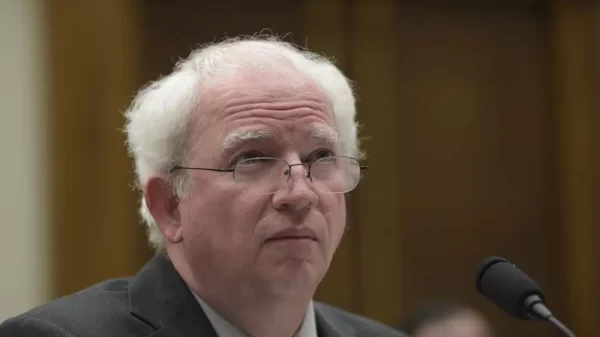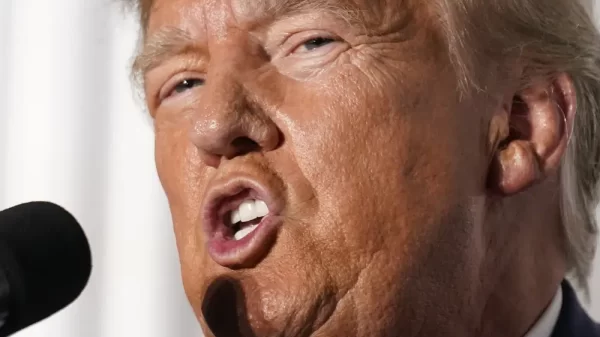IT’S A GIVEN THAT ONLY jurists of high achievement are chosen for a seat on the Supreme Court. Amy Coney Barrett, the federal appellate judge President Donald Trump has picked to replace the late Justice Ruth Bader Ginsburg, is no exception, with a law career marked by superlatives.
In college, she was a Phi Beta Kappan, graduated with honors, was the school’s top English major and wrote a senior thesis that was selected best in class. At Notre Dame Law School, which she attended on a full academic scholarship, Barrett graduated magna cum laude and won awards for her superior exam scores. She clerked for the late Justice Antonin Scalia, who reportedly considered Barrett his all-time favorite, and when she returned to Notre Dame to teach constitutional law she was voted best professor three times.
If she wins confirmation to the high court, the 48-year-old would be its youngest member.
Yet perhaps Barrett’s most important accomplishment doesn’t appear on her glittering CV: the support of influential conservatives and anti-abortion heavyweights in Washington, who convinced Trump to put her on his Supreme Court short list.
Leonard Leo, executive vice president of the Federalist Society and architect of Trump’s plan to shift the court to the right, has described Barrett as having “a lot of name recognition” on the right who will have “a lot of folks” lining up behind her.
Marjorie Dannenfelser, president of the Susan B. Anthony List, an anti-abortion organization, describes Barrett as “the perfect combination”: a brilliant jurist and devout Catholic who will challenge abortion on demand from a conservative female point of view. John Malcolm, a legal expert at the conservative Heritage Foundation, called Barrett “a favorite among social conservatives.”
Trump himself purportedly told confidantes he passed over Barrett for earlier vacancies because he was “saving” her to replace the ailing Ginsburg, an octogenarian who in recent years had fought multiple bouts with pancreatic cancer.
But Barrett’s conservative views in general – and her opinions and writings on women’s rights and reproductive rights in particular – has activists on the left sounding the alarm. They argue that, if confirmed, Barrett will undo the hard-won legacy of her predecessor and attack the Roe v. Wade decision legalizing abortion.
“Make no mistake: Judge Barrett’s confirmation will be the wrecking ball that finally smashes Roe v. Wade and undoes the Affordable Care Act,” Lara Bazelon, a law professor at the University of San Francisco School of Law, wrote in The New York Times. “Her crucial vote on these cases and so many others will undo decades of the progress that Justice Ginsburg worked her whole life to achieve.”
It’s clear that Barrett has the academic credentials for a seat on the high court.
After graduating from a Catholic girls’ school in New Orleans, the Metairie, Louisiana, native attended Rhodes College, a small, Presbyterian-affiliated school in Memphis. There, she began collecting accolades, including graduating manga cum laude.
Barrett’s star continued to ascend at Notre Dame University Law School: In addition to being selected as executive editor of the school’s law review, she won praise for earning the best exam scores in 10 of her courses and graduated at the top of her class.
Her path into the legal profession included two prestigious federal judicial clerkships: first with Judge Laurence Silberman of the U.S. Court of Appeals for the District of Columbia Circuit – a storied bench that is considered a feeder for the Supreme Court – and then with Scalia, whom activists on the right consider the quintessential conservative jurist.
After a brief stint in private practice and a fellowship at George Washington University, Barrett returned to Notre Dame in 2002, where she’s been a full professor since 2010.
Though she was on his vaunted list of potential conservative Supreme Court justices, Trump instead selected Barrett to fill a vacancy in the Chicago-based U.S. Court of Appeals for the 7th Circuit in 2017. The pick raised eyebrows: Barrett’s career path wound through academia, not a courtroom, and she had scant experience as a litigator for such a prestigious job.
Though Barrett ultimately won confirmation with bipartisan support, her Senate hearings were politically contentious: Democrats saw her as a female clone of Scalia, a rock-ribbed conservative Catholic who was the bane of liberals, while Republicans resented suggestions she could not separate her faith from a judge’s duty to uphold the law.
“You have a long history of believing that your religious beliefs should prevail,” Sen. Dianne Feinstein, a California Democrat and ranking member of the judiciary committee, said during Barrett’s appellate court confirmation hearing. “The dogma lives loudly within you.”
Feinstein’s remark, however, elevated Barrett to rock-star status among conservatives, who printed the remark on coffee mugs and T-shirts in defiance of what they saw as Feinstein’s anti-Catholic bias.
Barrett insisted during her hearing she would set aside her beliefs and respect the law as well as court precedent. But in a panel discussion at Jacksonville University in 2016, Barrett suggested that restrictions on abortion could happen without overturning the Roe decision.
“I don’t think the core case – Roe’s core holding that women have a right to an abortion – I don’t think that would change,” Barrett reportedly said. “But I think the question of whether people can get very late-term abortions, you know, how many restrictions can be put on clinics, I think that will change.”[
READ: Supreme Court Showdown Carries Consequences for Obamacare ]
Barrett’s personal life is noteworthy: She’s the mother of seven children. She also belongs to the secretive People of Praise, a faith group that preaches a conservative doctrine far to the right of mainstream Christian orthodoxy.
Though she sits on a court based in Chicago, Barrett commutes from her home in South Bend, a 90-minute drive one-way. She’s written about 100 opinions and dissents that demonstrate her conservative judicial philosophy on issues including guns, sexual assault on campus and abortion rights.
While she has insisted she will respect Supreme Court precedent, both liberals and conservatives believe she was nominated specifically to deliver another crippling blow to the Roe decision. And, like Scalia, Barrett embraces an “originalist” or “textualist” viewpoint, a judicial philosophy in which constitutional questions are considered through the framers’ original intent.
If confirmed, she would be the sixth Catholic on the high court – Justices Elena Kagan and Stephen Breyer are Jewish, and Justice Neil Gorsuch was raised Catholic but reportedly worships with Episcopalians. And she would be the latest justice with strong ties to the Federalist Society, a low-profile but increasingly powerful legal organization.
Because Senate Democrats don’t have the votes to derail a quick confirmation by the Republican majority, Barrett could reach the high court before the Nov. 3 election, locking in a reliable 6-3 conservative majority for decades to come. But at least one Supreme Court observer believes that her originalist views of the Constitution would occasionally benefit liberals and give conservatives heartburn.
“Precisely how a Justice Barrett will surprise her critics and fans is unknown,” Saikrishna Prakash, a professor at the University of Virginia School of Law, told Politico. “But with perhaps almost two decades of service in front of her, what is certain is that she will do the unexpected. She is not a results-first, principles-second sort of jurist. And her principled stances on interpretation and the judicial role will lead her to unexpected outcomes.”






























You must be logged in to post a comment Login